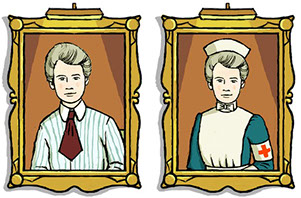Who Was Edith Cavell?
The School Council decided to research the life of Edith Cavell after whom our School was named when it opened in 1974. We already knew that she was a British nurse during World War 1 and that she helped soldiers escape from the Germans.
Edith Cavell was born on December 4th 1865 in a place called Swardeston, Norfolk where her father was a Vicar. She always wanted to help people and became a fund raiser (like the School Council) to help pay for a room for the Sunday School to use. She sold paintings and drawings of flowers that she had drawn.

The School Council decided to research the life of Edith Cavell after whom our School was named when it opened in 1974. We already knew that she was a British nurse during World War 1 and that she helped soldiers escape from the Germans.
Edith Cavell was born on December 4th 1865 in a place called Swardeston, Norfolk where her father was a Vicar. She always wanted to help people and became a fund raiser (like the School Council) to help pay for a room for the Sunday School to use. She sold paintings and drawings of flowers that she had drawn.
One of Edith’s first jobs was as a governess looking after families in England and Europe. On holiday, in Belgium, she visited a hospital and was impressed by the nurses that she saw and the care they gave. Back in Norfolk after looking after her father when he was very ill, Edith decided to train to be a nurse herself and soon became well known for her skills and the care she gave to all her patients. By 1907 she was working in Brussels, Belgium and was asked to train nurses at a hospital there.
Nurse Cavell was home visiting her Mother when she heard the news that German soldiers had invaded Belgium. She decided to return there and carry on working telling the Nurses that they should treat everyone, regardless of what Countries they were from or which army they fought for. Eventually the clinic where she worked became a Red Cross Hospital. This meant that they were neutral and did not take sides. Unfortunately, the Hospital was taken over by the Germans, all the other British Nurses, apart from Edith and one other, were sent home. Edith should have taken notice of all the posters which warned, “Any male or female who hides an English or French soldier in his house shall be severely punished”. Instead she displayed the courage to stick to her beliefs and cared for wounded soldiers, helping over 200 Allied soldiers escape from the Germans.
Even though Edith was warned that the Germans were watching her and she would face terrible consequences or trouble if she was caught, she carried on, feeling that it was her duty to do so.August 15th 1915 saw Edith arrested by the German police and charged with the crime of assisting or helping the enemy. After ten weeks in prison, Edith’s court trial began. She knew that she would be executed, sentenced to death, if she was found guilty. Edith felt that she could not tell a lie in order to help save her life, so she admitted that she had helped soldiers to escape knowing that they would be able to fight the German army again.
After two days Edith was found guilty. Even then she said she was willing to give her life for her country, still showing courage and truthfulness, “I expected my sentence and I believe it was just. Standing as I do in view of God and Eternity, I realise that patriotism is not enough, I must have no hatred or bitterness towards anyone”. Nurse Cavell was executed on the morning of the 12th of October 1915.
There has been a recent campaign to have Edith Cavell pictured on a new £2 coin next year as a mark of respect and recognition.